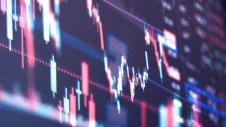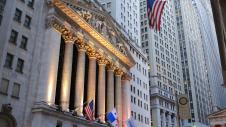With a jump of 14.8 percent from the lows of August (225.97 points, 10/08) and 8 percent in the last four sessions, bank shares have returned dynamically to the forefront leading the upward reaction of the market.
The remarkable rise, however, does not particularly impress bank shareholders and those who more systematically monitor the stock market. Despite the rise in recent days, losses on the banking index since the beginning of the year are at some 60 percent - more than double the losses of the General Index.
The pandemic has rekindled investor concerns about the banks' capital positions and the potential for a drastic reduction in the stock of non-performing loans without further capital increases, given that it is certain that the pandemic will create a new generation of bad loans.
The banking sector, due to concerns about the long-term effects of the crisis on the quality of their portfolios, has come under stronger pressure in both Europe and the US. In Europe, the banking index has fallen since the beginning of the year by about 27 percent against a fall of 12 percent of the pan-European Euroxx 600 index, while in the US the banking sector has fallen by 20 percent versus a rise of 5.2 percent in the S&P 500.
In Greece, the concern is twofold, as in addition to the uncertainty about the effects of the new crisis on loan portfolios, domestic banks must quickly reduce the large stock of NPEs inherited from the ten-year fiscal crisis. Political stunts, interest groups and in many cases delays on the part of banks have resulted in a lot of time being lost on reducing NPLs despite the global sentiment having been supportive.
Is the sell-off justified?
The existing (large) stock of bad loans, the new one to be created by the pandemic, the quality of capital (with the large participation of deferred tax credits) and the risk of a new recapitalization are the main sources of concern that have put pressure on bank shares.
Additionally, market professionals point out that the limited depth of the domestic market and uncertainties in the sector have created fertile ground for short investors, whose presence discourages other investors with a steady outlook.
The challenges are indeed great but many analysts point out that the sell-off that has occurred is excessive. In contrast to the previous crisis, this time domestic banks enjoy the full support of regulator, the European Central Bank, both in terms of strengthening liquidity and the capital base and the more flexible treatment of bad loans created by the pandemic.
In addition, all new non-performing loans created by the coronavirus are likely to be treated in an unconventional way: they will not burden the banks' balance sheets and banks will be given time to deal with them.
Bank officials estimate that eventually the NPLs to be created by the coronavirus will fluctuate in the lower range of estimates ranging between 5 to 10 billion euros. They note that a significant number of companies that are under strong pressure due to the crisis were already in the "red" before the arrival of the coronavirus.
At the same time, new weapons, such as the creation of a bad bank proposed by the Bank of Greece, can provide a solution to the new NPEs, while allowing for the faster reduction of the old stock.
A big question mark is how much the new crisis will affect the ongoing transactions NPL portfolios being planned by banks utilizing the Hercules plan. The big transaction of Alpha Bank is in progress, whose officials are optimistic about the successful completion of its sale, while Piraeus Bank will follow with other securitizations.
It is noted that the large securitization of Eurobank, Cairo, which was completed in early June, had only minor adjustments compared to the initial agreement of December 2019, before the outbreak of the coronavirus.









